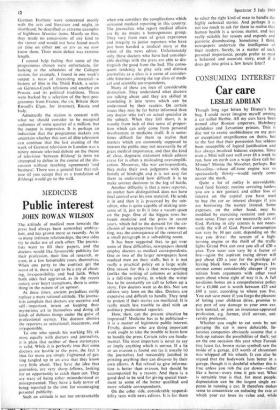MEDICINE
Public interest
JOHN ROWAN WILSON
The attitude of medical men towards the press had always been somewhat ambiva- lent, and has grown more so recently. As in so many intimate relationships, the two sides try to make use of each other. The journa- lists want to fill their papers, and the doctors would like favourable publicity for their profession, their line of research, or even, in a few lamentable cases, themselves. When one party to the contract get the worst of it, there is apt to be a cry of cheat- ing, irresponsibility, and bad faith. When both sides feel aggrieved, as in the recent outcry over heart transplants, there is some- thing in the nature of an uproar.
At these times, ancient prejudices easily replace a more rational attitude. The journa- lists complain that doctors are secretive and self - important, intent on keeping their mysterious art to themselves and doing all kinds of dubious things under the guise of professional secrecy. The doctors dismiss the reporters as sensational, inaccurate, and irresponsible.
To one who spends his working life al- most equally with doctors and journalists, it is plain that neither of these stereotypes is valid. While it is perfectly true that some doctors are hostile to the press, the fact ;.s that far more are simply frightened of get- ting tangled up in an area that they know very little about. They have the idea that journalists are very sharp fellows, looking for an opportunity to catch them out. They are wary of being either misunderstood or misrepresented. They have a holy terror of being reported to the cmc for encouraging personal publicity.
Such an attitude is not too unreasonable when one considers the complications which surround medical reporting in this country. The journalists who report medical affairs are by no means a homogeneous group. They vary from men of great experience and integrity to junior reporters who have just been handed a medical story at the whim of the news editor. Unfortunately only those doctors who have had consider- able dealings with the press are able to dis- tinguish the good from the bad. The conse- quent tendency to play safe and distrust journalists as a class is a cause of consider- able bitterness among the top class of medi- cal and scientific correspondents.
Many of these are men of considerable distinction. They understand what doctors are talking about and they are skilled at translating it into terms which can be understood by their readers. On certain issues they may be far better informed than any doctor who isn't an actual specialist in the subject. When they fall short, it is usually from lack of that sense of propor- tion which can only come from personal involvement in medicine itself. It is some- times difficult for them to realise that matters which are commonly supposed to interest the public may not necessarily be of great medical importance, and that the kind of clear, dogmatic statement which editors crave for is often a misleading oversimplifi- cation. Moreover, like war correspondents, they make their own judgments with the benefit of hindsight and it is not easy for them to understand how difficult it is to make correct decisions in the fog of battle.
Another difficulty is that a news reporter, no matter how distinguished, does not have final control over his own material. He sends it in and then it is processed by the sub- editor, who is quite capable of making non- sense of it, just to fit it into a vacant space on the page. One of the biggest rows be- tween medicine and the press in recent years, which led to the demand for the ex- clusion of newspapermen from a BMA meet- ling, was the consequence of the removal of a small paragraph in a sub-editing room.
It has been suggested that, to get over some of these difficulties, newspapers should employ doctors as medical correspondents. One or two of the larger newspapers have medical men on their staffs, but it is not really a practical policy on a large scale. One reason for this is that news-reporting (unlike the writing of columns or articles) is a full-time activity, in which the writer has to be constantly on call to follow up a story. Few doctors want to do this. Nor are editors very keen on the idea. Doctors are expensive and difficult to handle. They tend to protest if their stories are mutilated. It is really much less trouble to deal with an ordinary professional reporter.
How, then, can the present situation be improved? Medicine has to be publicised— it is a matter of legitimate public interest. Firstly, doctors who are doing important work ought to take the trouble to learn how to handle the press. Certain rules are funda- mental. The most important is never to say or imply anything which is untrue. If a lie or an evasion is found out (as it usually is) the journalists feel reasonably justified in printing anything they can discover by their own efforts. A flat refusal to give informa- tion is better than evasion, but should be accompanied by a reason. And there is a good deal to be said for giving special treat- ment to some of the better qualified and more reliable correspondents.
On the other side, considerable responsi- bility rests with news editors. It is for them to select the right kind of man to handle the highly technical stories. And perhaps it is not too much to ask for them to realise that human health is a serious matter, and not really suitable for scoops and expos& and patriotic drumbeating. Sometimes I think newspapers underrate the intelligence of their readers. Surely, in a matter of such personal importance, people prefer to read a balanced and accurate story, even if it does get into print a few hours later?


































 Previous page
Previous page